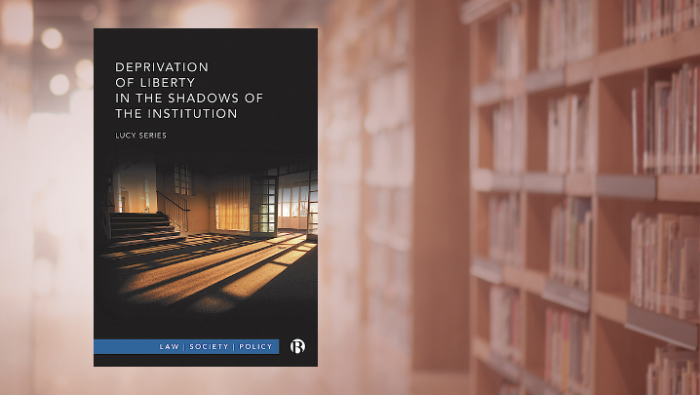
Social Care Detention in the Post-Carceral Era

Almost half a century into deinstitutionalisation —the process of relocating disabled people out of large institutions into ‘community’ settings— a new legal question emerged: are some people who draw on care and support in community deprived of their liberty? In Cheshire West, the UK Supreme Court’s response to this question was affirmative, because in Lady Hale’s words, a “gilded cage is still a cage”. Lucy Series’ book Deprivation of Liberty in the Shadows of the Institution addresses this entangled question and provides a timely intervention into broader social and legal debates on the meanings and uses of ‘deprivation of liberty’ in the post-carceral era in the UK and internationally.
Grounded in critical disability studies, carceral studies and geographies of care, Series’ book sets out the discussion by looking at the question of ‘deprivation of liberty’ through the lens of ‘social care detention.’ Social care detention refers to “a particular regulatory framing […] imposed over an underlying material reality of ‘institutional’, restrictive, supervisory and sometimes coercive practices in post-carceral community care settings” (p.3). An increasingly prevalent socio-legal phenomenon in Western jurisdictions, that in England and Wales is regulated through the Deprivation of Liberty Safeguards (to be replaced by the Liberty Protection Safeguards) of the Mental Capacity Act (MCA) 2005, social care detention is underpinned by post-carceral ideologies of care that emphasize autonomy, choice and person-centredness. Yet, despite these credentials, Series asserts that laws governing social care detention are not necessarily less coercive or more liberating than ‘compulsory’ powers of its older counterpart of mental health detention. Many people in contemporary community care settings remain under conditions of surveillance, control and domination.
A substantial portion of the book is devoted to the ambitious task of charting the complex and evolving history of confinement of people with cognitive disabilities (understood as those with dementia, brain injury or developmental disability). Following the tradition of Foucauldian critical genealogy, Series carefully traces how carceral logics have persisted and co-exist in contemporary social care arrangements alongside —and despite— reformist and abolitionist pushes against institutionalisation. Perhaps one of the most compelling elements of the analysis here is Series’ discussion of the pervasive construction of people with cognitive disabilities as ‘non- volitional’. Seen as “possessing neither a ‘will’ nor ‘liberty’” (p.18), social care detention’s target populations have thus been “consigned to a realm beyond the law” (p.31) to be managed via informality (as opposed to legalism).
Cheshire West was a watershed moment in this troubled history. It rejected the informal management of people with cognitive disabilities and inscribed their long-neglected legal personhood in capacity jurisdiction. Yet, as Series claims, its discounting of the subjective experiences of the person (i.e. whether they are happy with their living arrangements or not) has been shaped by, and reproduced the legacy of the ‘non-volitional’. Indeed, one of the most unsettling outcomes of the judgment is that a person living happily in their own home could be considered deprived of their liberty just because they do not pass the mental capacity test required to be able to perform legally valid acts. Article 12 of the UN Convention on the Rights of People with Disabilities (CRPD) has radically challenged such denials of legal capacity on the basis of mental capacity, rejecting the logics of the ‘non-volitional’. Series contends that the conceptual and practical approaches offered by the CRPD’s universal capacity paradigm (e.g. ‘valid consent’ model) could potentially resolve this paradox by centring the decision-making process on ‘the will and preferences of the individual’.
Series’ insightful, grounded treatment of the ‘home’ vs ‘institution’ dichotomy represents one of the most productive lines of thought in the book. Turning to the literature on ‘total institutions’ and ‘homes’, Series reconceptualises the dichotomy in terms of the ‘decision spaces’ that they afford to their dwellers. In this account, institutions are constrained decision spaces, marked by an erosion of choice and loss of control. ‘Home’, then, is better understood as a space rich with opportunities for decisions-making that are central to one’s self-identity and well-being. This reconceptualisation, Series suggests, helps better formulate positive goals: of enabling people to live in an expansive and responsive decision space they can make home in line with their will and preferences, with suitable support and safeguards where needed.
Deprivation of Liberty in the Shadows of the Institution demonstrates a long-term engagement with the field and deep care for people subject to the regimes that it sheds light on. It is an insightful resource for scholars working on mental capacity, social care law and disability human rights. Series’ analysis opens a window to understand the dynamics behind, and conditions for the incomplete promise of the post-carceral era. The cautionary tale it tells is of interest to the wider socio-legal community, particularly to those who are keen on understanding how the juridification of social problems can blunt critical possibilities by pulling us back to the historical discourses and practices that we aim to break away from.
Further reading: Lucy Series on social care detention

